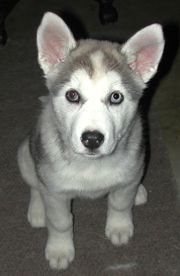Best breed?
@alammujtehadi (77)
India
January 31, 2007 4:02pm CST
what do you think is the best breed of dogs according to you and why do you think so...well i think that a mastiff is the best dog 'coz i simply luv d dog....its big...strong nd so unlikely to find in the country i live in....i so envy all u lucky people who own 1(if n e 1 does...)..
1 person likes this
5 responses
@BlaKy2 (1475)
• Romania
31 Jan 07
I think that the best breed is wolfdog.
A wolfdog (also called a wolf hybrid or wolf-dog hybrid) is a canid hybrid resulting from the mating of a wolf (Canis lupus) and a dog (Canis lupus familiaris). The term "wolfdog" is preferred by most wolfdog proponents and breeders, as they contend that these animals are not hybrids at all, as one is a subspecies of the other. (In 1993, the domestic dog C. l. familiaris was reclassified by the scientific community as a subspecies of wolf, C. lupus.) Wolfdogs are hybrids in the sense that they are a cross of a species with a subspecies. Professional organizations such as the AVMA and government agencies such as the USDA refer to the animals as wolf-dog hybrids . In the United Kingdom, they are considered a hybrid for legal purposes .
The characteristics of an animal created by breeding a wolf to a dog are not predictable. In some cases the resulting adult wolfdog may be larger than either of its parents due to the genetic phenomenon of heretosis. Wolfdogs retain various traits of each parental line along with having traits that differ from either; their behavior and physical characteristics range from predominantly wolf-like to predominantly dog-like.
A wolfdog may also be an animal with both wolf and dog ancestry within recent generations (i.e. not neccessarily a 50:50 mix), or an officially recognized breed created by introducing wolf lineage into an established dog breed.
Controversy
The wolfdog has been the center of much controversy for the past few decades. Laws in many European countries, most states and many counties and municipalities in the U.S. either outlaw the animal entirely or put restrictions on ownership. In the UK, the Dangerous Wild Animals Act (1976) regulates the keeping of wolfdogs as pets. The British government agency DEFRA administers the regulations; licensing of the animals is done by local authorities.
This legislation is partially in response to the controversy over how much of the characteristics of wolves are inherited into crossbred offspring, and to reports of marketing abuse when presenting wolfdogs or wolf-like dogs to the public . The view that aggressive characteristics are inherently a part of wolfdog temperment has been contested in recent years by advocates of wolfdogs as companion animals . However, most wolf and wolfdog rescue organizations maintain wolfdogs retain many of the traits and requirements of their wild relatives and are therefore inappropriate as domestic pets. In 2000, DEFRA and the Royal Society for the Prevention of Cruelty to Animals released a lengthy study that concluded that much of the aggressiveness attributed to wolfdogs is due to the characteristics of the breeds of dogs the wolves are bred with since wolves themselves are not intrinsically aggressive and tend to avoid contact with humans. The same study identified other common problems with domestic keeping of wolfdogs such as difficulty in housetraining, inappropriate scent marking, excessive shedding, destructive behavior due to natural curiosity, and moody behavior when left alone. Much of this is attributed to different selective evolutionary pressures on the development of the two types of animals. The same study found several examples of misrepresentation by breeders and indeterminate levels of actual wolf pedigree in many animals sold as wolfdogs. The report noted that many persons in the general public misidentify dogs with wolf-like appearance as wolfdogs .
Both sides of the controversy agree that wolfdogs require care and an environment different from either wolves or dogs.
Origins
Research into the genetic makeup of dogs and wolves indicates the two species initially diverged approximately 100,000 years ago and have interbred occasionally since.
Evidence for prehistoric domesticated wolfdogs in the Americas dates back at least 10,000 years while fossil evidence in Europe points to their use in hunting mammoths[15]. Noted historic cases (such as the Cevennes, France wolf-attack incidents of 1764-1767) of large wolves that were abnormally aggressive towards humans, may be attributible to wolf-dog mating . While accidental pairings may have occurred intermittently, modern wolfdogs are almost exclusively the result of arranged matings between domestic dogs and lines of wolves that have been in captivity for generations.
Dog breeds containing wolf lineage
A few dog breeds such as the Czechoslovakian Wolfdog that began with wolf-dog interbreeding are accepted as recognized breeds by authorities such as the FCI. One should note, however, that these dogs have been selectively bred over many generations to produce desirable traits, have FCI established breed standards, and are not first generation wolf-dog hybrid animals. Established, reputable breeders can supply multi-generation pedigrees, as with any other purebred dog.
@vicky_lane4987 (980)
•
31 Jan 07
my faovurite breed of dog is german sheperd, i love my dog floss, she is a german sheperd...and she is the most loving, funny and cute dog i have met









